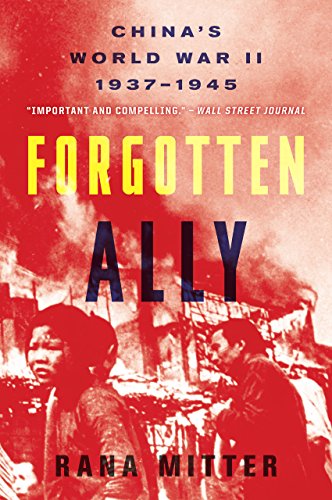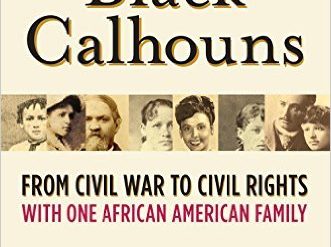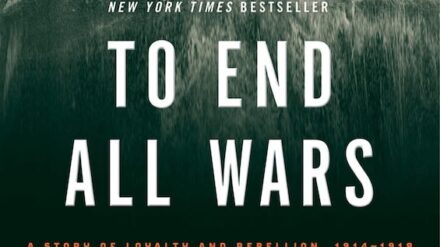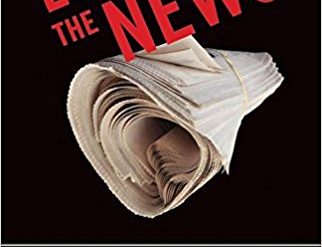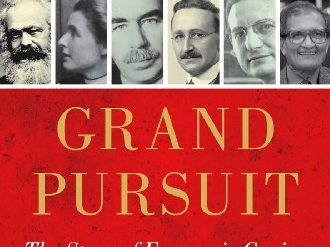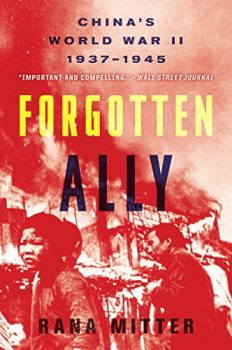
Read just about any popular history of World War II, and you’ll find any number of references to the Allies as the Big Three of Britain, the US, and the Soviet Union. What’s missing is recognition that China bore nearly as high a price as the USSR, with an estimated fourteen to twenty million dead compared to fewer than half a million for the UK and the US. (The Soviet Union lost as many as twenty-four million dead.) On that basis alone, Oxford University historian Rana Mitter is justified in titling his revisionist history of China in World War II Forgotten Ally. But, as he explains at length, recognition of China’s contribution to the war effort is overdue on a far broader basis than that.
Estimated reading time: 6 minutes
Dueling myths and torrents of propaganda
China’s World War II experience has generated dueling myths and torrents of propaganda. In China itself, Mao Zedong’s government long suppressed any favorable comment about the performance of Chiang Kai-shek‘s Nationalists, or indeed that of any of his or Mao’s competitors for power. (Mao didn’t attain the undisputed leadership of the Communist Part until the war was nearly over, and Chiang was never fully secure at the top of the Nationalists until he fled to Taiwan in 1949.) So-called warlords always controlled large swaths of territory.) In Forgotten Ally, Mitter attempts to set the record straight. To a considerable extent, he succeeds.
Forgotten Ally: China’s World War II, 1937-1945 by Rana Mitter (2013) 480 pages ★★★★☆
Today’s China was forged in the war with Japan
“Contemporary China is thought of as the inheritor of Mao’s Cultural Revolution,” Mitter writes, “or even of the humiliation incurred by the Opium Wars of the nineteenth century, but rarely as the product of the war against Japan . . . [T]hat history disappeared down a hole created by the early Cold War, from which it has only recently reappeared.” And Mitter’s book is an effort to rebalance the history books, asserting that World War II merits a preeminent position in modern Chinese history. He also attempts in Forgotten Ally to dispel the simplistic notion that the war involved a two-way struggle between Nationalists and Communists. “A new history of China’s wartime experience must take account of the three-way struggle for a modern China: Nationalist, Communist, and collaborationist.”
A fundamental disconnect between China and the West
There was a fundamental disconnect between the Chinese and Western views of China’s role in the war. “The problem,” Mitter writes, “was that [they] looked at China’s role through almost entirely different lenses. To the Western allies, China was a supplicant, a battered nation on its knees, waiting for the Americans and British to save it from certain destruction at the hands of the Japanese. In Chiang’s view and that of many Chinese, their country was the first and most consistent foe of Axis aggression.” [By most reckoning, World War II did, in fact, start in 1937 in China and only in 1939 in Europe.]
“Despite numerous opportunities to withdraw from the conflict, China had fought on when the prospects of outside assistance seemed hopeless, and it now deserved to be treated as an equal power.” The result of this disconnect was that “the British and Americans wished to give the impression that China was a serious ally without actually putting much effort into the relationship, while Chiang overestimated what he was worth to the Western Allies.” As Mitter reports, “In 1941 and 1942 the total proportion of US Lend-Lease aid to China was around 1.5 percent of the total, dropping to 0.5 percent in 1943 and 1944, and would rise to 4 percent only in 1945.”
Why China should be considered the fourth Ally
Mitter’s argument that China deserves more recognition for its role in World War II rests on four premises, each of which he takes great pains to justify.
China might have surrendered. Chiang and Mao didn’t.
Almost throughout the course of China’s eight-year war with Japan (1937-45), prospects for Chinese victory were slim at best. Less resolute Chinese leadership might well have sought peace with the Japanese. In fact, Wang Jingwei, a now little-recognized Chinese official who had been Sun Yat-sen‘s designated successor, did collaborate with the Japanese. He served as head of a puppet regime in Nanjing from 1940 until his death in 1944. Yet Chiang’s troops managed to hold down more than half a million Japanese troops who might otherwise have been posted to the war in the Pacific and South Asia.
Chiang kept the country united against Japan.
Chiang Kai-shek was a far better leader than most accounts give him credit for. In fact, he was the only person who could command a true national presence. Chiang’s competitors recognized this fact, and so did Mao. Although Chiang’s regime was at least as corrupt as his critics complain, and his in-laws were among the most notorious thieves in the country, Chiang himself was not on the take. Despite the corruption and the lack of cooperation from many of his generals, he did manage to maintain the resistance to Japan throughout the war.
Chiang was better than his critics contend.
Although Chiang was a poor tactician (and hindered by jealous and venal “warlords” as well), he was far more adept at war strategy. Complaints by General Joseph Stilwell and other Americans on the scene were overblown, in Mitter’s view. And Stilwell himself was not just ill-equipped to command soldiers in the field, he should (Mitter believes) have been court-martialed for deserting his troops in Burma and fleeing to India.
Nationalists and Communists cooperated to resist Japan.
Many accounts of the war in China emphasize the bitter enmity between Chiang’s Nationalists and Mao’s Communist Party. In fact, in one of the most notorious episodes in his life, Chiang had even attempted to exterminate the Communists when he turned on them in 1928 in Shanghai. Clearly, there was no love lost between them. But both men, and the overwhelming majority of their supporters, were prepared to set aside their differences to oppose the Japanese invasion of their country.
About the author
Cambridge-educated Rana Mitter is a British historian and political scientist of Indian origin who specializes in twentieth-century Chinese history at the University of Oxford. He is also a familiar presence on BBC Radio. Forgotten Ally (published in the UK as China’s War with Japan, 1937-1945: The Struggle for Survival) is his third book.
For related reading
I recently reviewed another book that casts light on the history of China in the twentieth century: Big Sister, Little Sister, Red Sister: Three Women at the Heart of Twentieth-Century China by Jung Chang. Chang, a biographer, ascribes more influence to the Soong sisters than Mitter does; I’m inclined to place more credence in her view than in Mitter’s. My review is at They shaped twentieth-century Chinese history.
You’ll find this book on The 40 best books of the decade from 2010-19 and on Books about World War II in the Pacific.
You might also be interested in:
- Insightful books about China
- 10 top nonfiction books about World War II
- 20 top nonfiction books about history
And you can always find my most popular reviews, and the most recent ones, on the Home Page.

